LC459 - Biomedicine's Role in Health & Illness in Contemporary UK
VerifiedAdded on 2023/05/30
|8
|2075
|239
Essay
AI Summary
This essay examines the rise of biomedicine and its relevance to health and illness in contemporary British society. It discusses the emergence of biomedicine and its impact on public health in Britain, highlighting its role in understanding the causes of diseases and improving general health. The essay also explores the historical development of biomedicine, particularly after World War II, with increased investment in research leading to significant advancements in the diagnosis and treatment of diseases like tuberculosis, cancer, and cardiovascular diseases. It further delves into the evolution of biomedicine in the United Kingdom, emphasizing the contributions of biological and laboratory research, such as the discovery of DNA and genes, and the establishment of research units in major hospitals. The essay concludes by acknowledging Britain's tremendous improvement in the medical world, attributing it to strong research institutions, government investment, and robust legislation, policies, and regulations in the field of medical intervention.
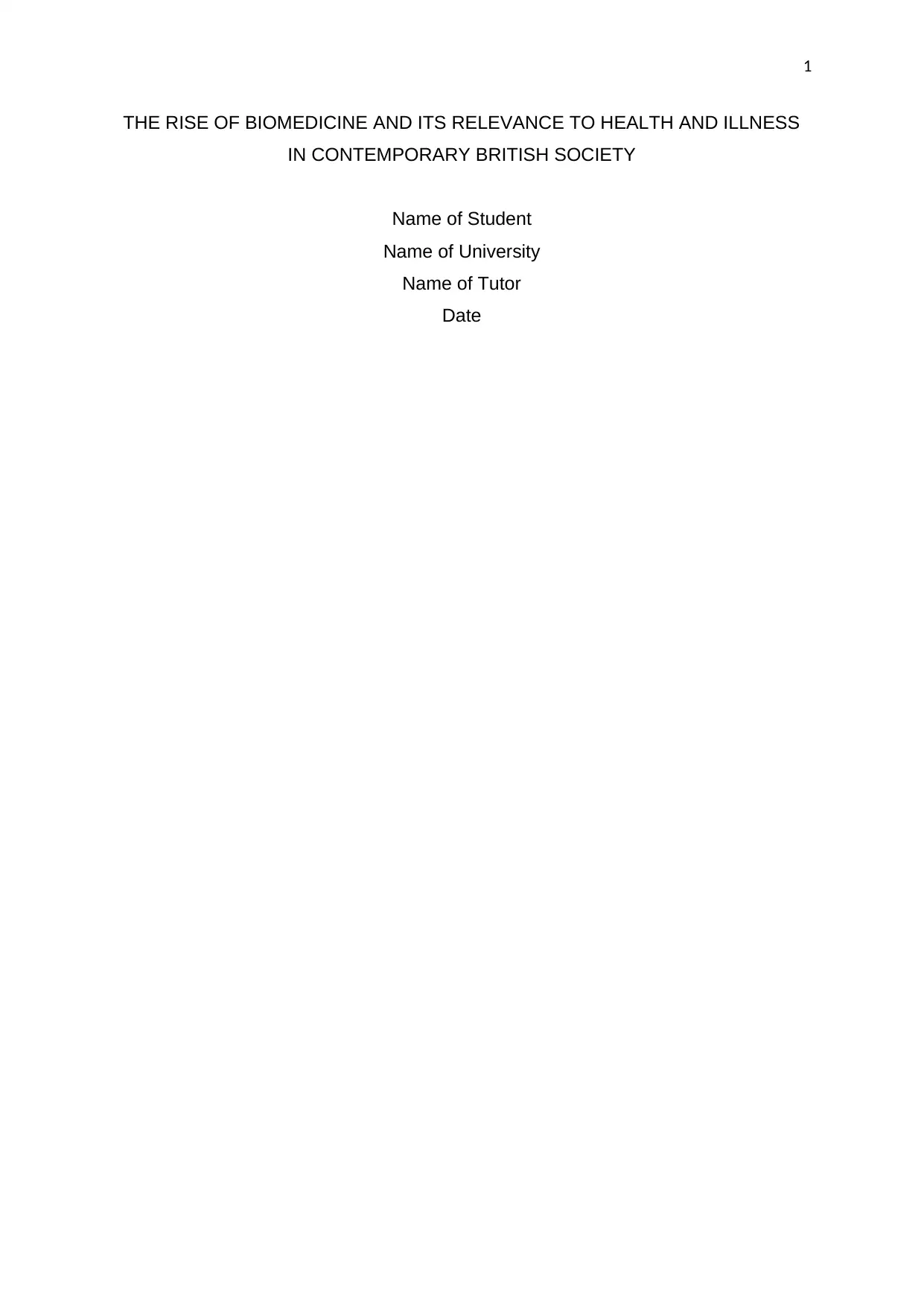
1
THE RISE OF BIOMEDICINE AND ITS RELEVANCE TO HEALTH AND ILLNESS
IN CONTEMPORARY BRITISH SOCIETY
Name of Student
Name of University
Name of Tutor
Date
THE RISE OF BIOMEDICINE AND ITS RELEVANCE TO HEALTH AND ILLNESS
IN CONTEMPORARY BRITISH SOCIETY
Name of Student
Name of University
Name of Tutor
Date
Paraphrase This Document
Need a fresh take? Get an instant paraphrase of this document with our AI Paraphraser
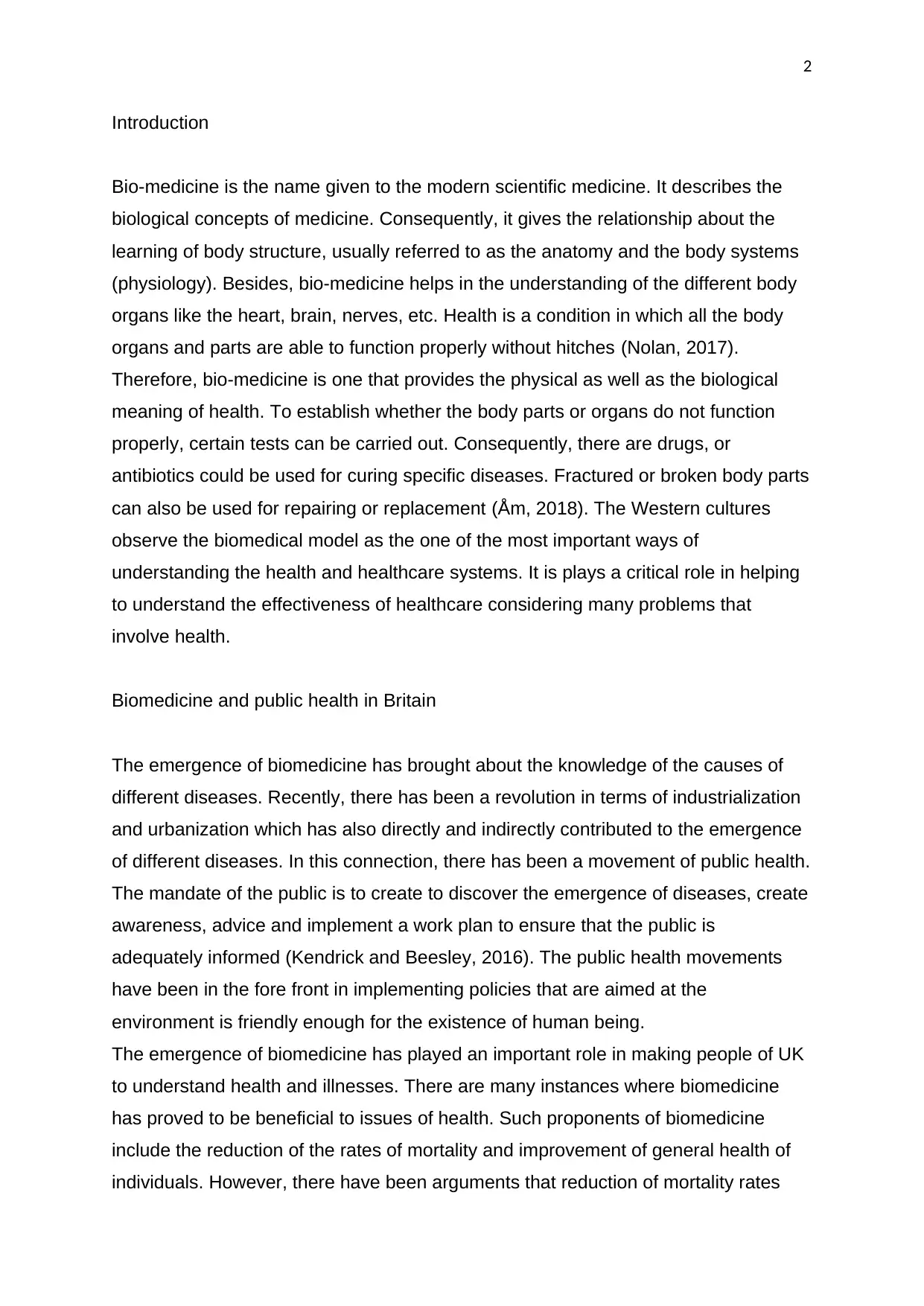
2
Introduction
Bio-medicine is the name given to the modern scientific medicine. It describes the
biological concepts of medicine. Consequently, it gives the relationship about the
learning of body structure, usually referred to as the anatomy and the body systems
(physiology). Besides, bio-medicine helps in the understanding of the different body
organs like the heart, brain, nerves, etc. Health is a condition in which all the body
organs and parts are able to function properly without hitches (Nolan, 2017).
Therefore, bio-medicine is one that provides the physical as well as the biological
meaning of health. To establish whether the body parts or organs do not function
properly, certain tests can be carried out. Consequently, there are drugs, or
antibiotics could be used for curing specific diseases. Fractured or broken body parts
can also be used for repairing or replacement (Åm, 2018). The Western cultures
observe the biomedical model as the one of the most important ways of
understanding the health and healthcare systems. It is plays a critical role in helping
to understand the effectiveness of healthcare considering many problems that
involve health.
Biomedicine and public health in Britain
The emergence of biomedicine has brought about the knowledge of the causes of
different diseases. Recently, there has been a revolution in terms of industrialization
and urbanization which has also directly and indirectly contributed to the emergence
of different diseases. In this connection, there has been a movement of public health.
The mandate of the public is to create to discover the emergence of diseases, create
awareness, advice and implement a work plan to ensure that the public is
adequately informed (Kendrick and Beesley, 2016). The public health movements
have been in the fore front in implementing policies that are aimed at the
environment is friendly enough for the existence of human being.
The emergence of biomedicine has played an important role in making people of UK
to understand health and illnesses. There are many instances where biomedicine
has proved to be beneficial to issues of health. Such proponents of biomedicine
include the reduction of the rates of mortality and improvement of general health of
individuals. However, there have been arguments that reduction of mortality rates
Introduction
Bio-medicine is the name given to the modern scientific medicine. It describes the
biological concepts of medicine. Consequently, it gives the relationship about the
learning of body structure, usually referred to as the anatomy and the body systems
(physiology). Besides, bio-medicine helps in the understanding of the different body
organs like the heart, brain, nerves, etc. Health is a condition in which all the body
organs and parts are able to function properly without hitches (Nolan, 2017).
Therefore, bio-medicine is one that provides the physical as well as the biological
meaning of health. To establish whether the body parts or organs do not function
properly, certain tests can be carried out. Consequently, there are drugs, or
antibiotics could be used for curing specific diseases. Fractured or broken body parts
can also be used for repairing or replacement (Åm, 2018). The Western cultures
observe the biomedical model as the one of the most important ways of
understanding the health and healthcare systems. It is plays a critical role in helping
to understand the effectiveness of healthcare considering many problems that
involve health.
Biomedicine and public health in Britain
The emergence of biomedicine has brought about the knowledge of the causes of
different diseases. Recently, there has been a revolution in terms of industrialization
and urbanization which has also directly and indirectly contributed to the emergence
of different diseases. In this connection, there has been a movement of public health.
The mandate of the public is to create to discover the emergence of diseases, create
awareness, advice and implement a work plan to ensure that the public is
adequately informed (Kendrick and Beesley, 2016). The public health movements
have been in the fore front in implementing policies that are aimed at the
environment is friendly enough for the existence of human being.
The emergence of biomedicine has played an important role in making people of UK
to understand health and illnesses. There are many instances where biomedicine
has proved to be beneficial to issues of health. Such proponents of biomedicine
include the reduction of the rates of mortality and improvement of general health of
individuals. However, there have been arguments that reduction of mortality rates
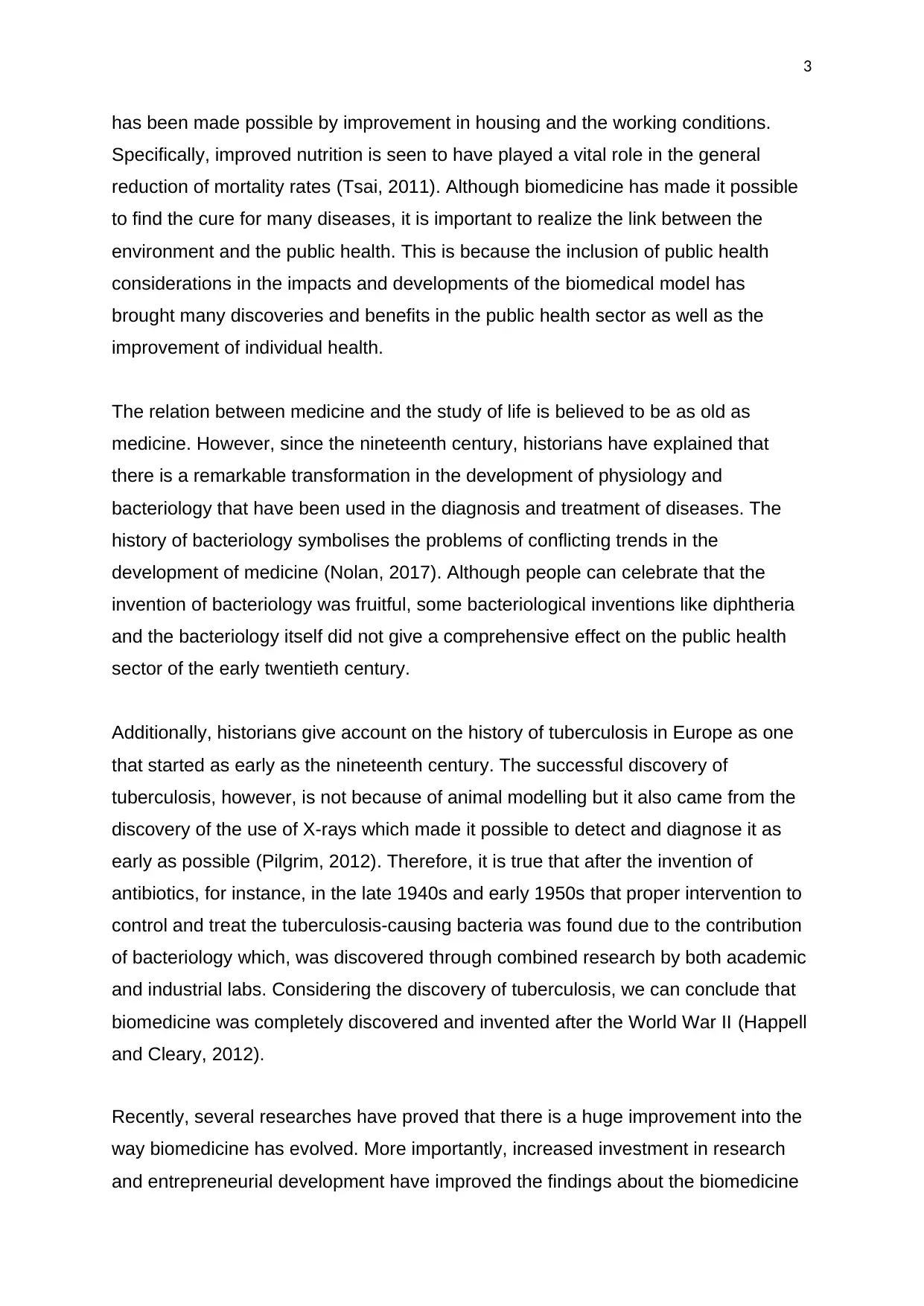
3
has been made possible by improvement in housing and the working conditions.
Specifically, improved nutrition is seen to have played a vital role in the general
reduction of mortality rates (Tsai, 2011). Although biomedicine has made it possible
to find the cure for many diseases, it is important to realize the link between the
environment and the public health. This is because the inclusion of public health
considerations in the impacts and developments of the biomedical model has
brought many discoveries and benefits in the public health sector as well as the
improvement of individual health.
The relation between medicine and the study of life is believed to be as old as
medicine. However, since the nineteenth century, historians have explained that
there is a remarkable transformation in the development of physiology and
bacteriology that have been used in the diagnosis and treatment of diseases. The
history of bacteriology symbolises the problems of conflicting trends in the
development of medicine (Nolan, 2017). Although people can celebrate that the
invention of bacteriology was fruitful, some bacteriological inventions like diphtheria
and the bacteriology itself did not give a comprehensive effect on the public health
sector of the early twentieth century.
Additionally, historians give account on the history of tuberculosis in Europe as one
that started as early as the nineteenth century. The successful discovery of
tuberculosis, however, is not because of animal modelling but it also came from the
discovery of the use of X-rays which made it possible to detect and diagnose it as
early as possible (Pilgrim, 2012). Therefore, it is true that after the invention of
antibiotics, for instance, in the late 1940s and early 1950s that proper intervention to
control and treat the tuberculosis-causing bacteria was found due to the contribution
of bacteriology which, was discovered through combined research by both academic
and industrial labs. Considering the discovery of tuberculosis, we can conclude that
biomedicine was completely discovered and invented after the World War II (Happell
and Cleary, 2012).
Recently, several researches have proved that there is a huge improvement into the
way biomedicine has evolved. More importantly, increased investment in research
and entrepreneurial development have improved the findings about the biomedicine
has been made possible by improvement in housing and the working conditions.
Specifically, improved nutrition is seen to have played a vital role in the general
reduction of mortality rates (Tsai, 2011). Although biomedicine has made it possible
to find the cure for many diseases, it is important to realize the link between the
environment and the public health. This is because the inclusion of public health
considerations in the impacts and developments of the biomedical model has
brought many discoveries and benefits in the public health sector as well as the
improvement of individual health.
The relation between medicine and the study of life is believed to be as old as
medicine. However, since the nineteenth century, historians have explained that
there is a remarkable transformation in the development of physiology and
bacteriology that have been used in the diagnosis and treatment of diseases. The
history of bacteriology symbolises the problems of conflicting trends in the
development of medicine (Nolan, 2017). Although people can celebrate that the
invention of bacteriology was fruitful, some bacteriological inventions like diphtheria
and the bacteriology itself did not give a comprehensive effect on the public health
sector of the early twentieth century.
Additionally, historians give account on the history of tuberculosis in Europe as one
that started as early as the nineteenth century. The successful discovery of
tuberculosis, however, is not because of animal modelling but it also came from the
discovery of the use of X-rays which made it possible to detect and diagnose it as
early as possible (Pilgrim, 2012). Therefore, it is true that after the invention of
antibiotics, for instance, in the late 1940s and early 1950s that proper intervention to
control and treat the tuberculosis-causing bacteria was found due to the contribution
of bacteriology which, was discovered through combined research by both academic
and industrial labs. Considering the discovery of tuberculosis, we can conclude that
biomedicine was completely discovered and invented after the World War II (Happell
and Cleary, 2012).
Recently, several researches have proved that there is a huge improvement into the
way biomedicine has evolved. More importantly, increased investment in research
and entrepreneurial development have improved the findings about the biomedicine
⊘ This is a preview!⊘
Do you want full access?
Subscribe today to unlock all pages.

Trusted by 1+ million students worldwide
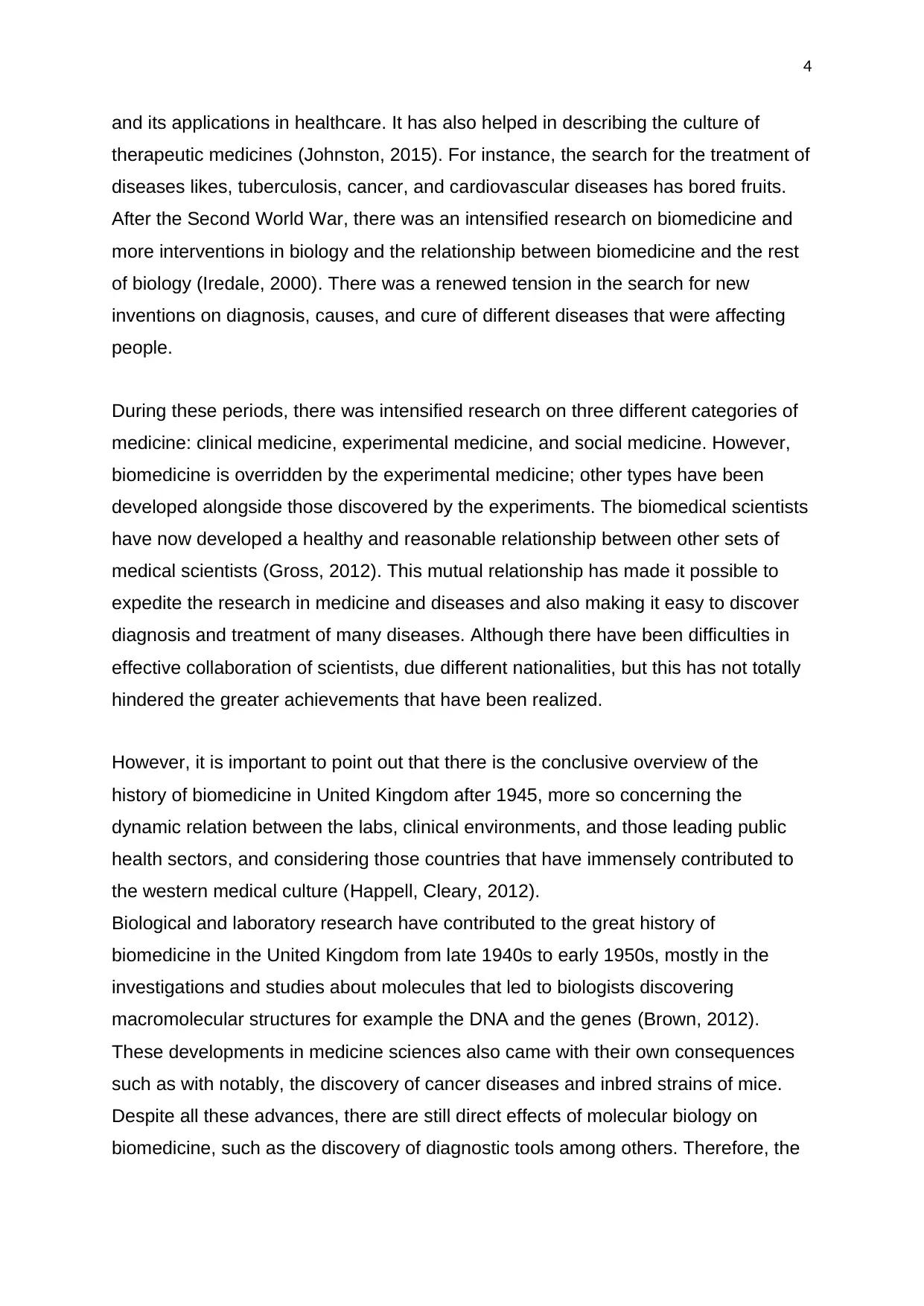
4
and its applications in healthcare. It has also helped in describing the culture of
therapeutic medicines (Johnston, 2015). For instance, the search for the treatment of
diseases likes, tuberculosis, cancer, and cardiovascular diseases has bored fruits.
After the Second World War, there was an intensified research on biomedicine and
more interventions in biology and the relationship between biomedicine and the rest
of biology (Iredale, 2000). There was a renewed tension in the search for new
inventions on diagnosis, causes, and cure of different diseases that were affecting
people.
During these periods, there was intensified research on three different categories of
medicine: clinical medicine, experimental medicine, and social medicine. However,
biomedicine is overridden by the experimental medicine; other types have been
developed alongside those discovered by the experiments. The biomedical scientists
have now developed a healthy and reasonable relationship between other sets of
medical scientists (Gross, 2012). This mutual relationship has made it possible to
expedite the research in medicine and diseases and also making it easy to discover
diagnosis and treatment of many diseases. Although there have been difficulties in
effective collaboration of scientists, due different nationalities, but this has not totally
hindered the greater achievements that have been realized.
However, it is important to point out that there is the conclusive overview of the
history of biomedicine in United Kingdom after 1945, more so concerning the
dynamic relation between the labs, clinical environments, and those leading public
health sectors, and considering those countries that have immensely contributed to
the western medical culture (Happell, Cleary, 2012).
Biological and laboratory research have contributed to the great history of
biomedicine in the United Kingdom from late 1940s to early 1950s, mostly in the
investigations and studies about molecules that led to biologists discovering
macromolecular structures for example the DNA and the genes (Brown, 2012).
These developments in medicine sciences also came with their own consequences
such as with notably, the discovery of cancer diseases and inbred strains of mice.
Despite all these advances, there are still direct effects of molecular biology on
biomedicine, such as the discovery of diagnostic tools among others. Therefore, the
and its applications in healthcare. It has also helped in describing the culture of
therapeutic medicines (Johnston, 2015). For instance, the search for the treatment of
diseases likes, tuberculosis, cancer, and cardiovascular diseases has bored fruits.
After the Second World War, there was an intensified research on biomedicine and
more interventions in biology and the relationship between biomedicine and the rest
of biology (Iredale, 2000). There was a renewed tension in the search for new
inventions on diagnosis, causes, and cure of different diseases that were affecting
people.
During these periods, there was intensified research on three different categories of
medicine: clinical medicine, experimental medicine, and social medicine. However,
biomedicine is overridden by the experimental medicine; other types have been
developed alongside those discovered by the experiments. The biomedical scientists
have now developed a healthy and reasonable relationship between other sets of
medical scientists (Gross, 2012). This mutual relationship has made it possible to
expedite the research in medicine and diseases and also making it easy to discover
diagnosis and treatment of many diseases. Although there have been difficulties in
effective collaboration of scientists, due different nationalities, but this has not totally
hindered the greater achievements that have been realized.
However, it is important to point out that there is the conclusive overview of the
history of biomedicine in United Kingdom after 1945, more so concerning the
dynamic relation between the labs, clinical environments, and those leading public
health sectors, and considering those countries that have immensely contributed to
the western medical culture (Happell, Cleary, 2012).
Biological and laboratory research have contributed to the great history of
biomedicine in the United Kingdom from late 1940s to early 1950s, mostly in the
investigations and studies about molecules that led to biologists discovering
macromolecular structures for example the DNA and the genes (Brown, 2012).
These developments in medicine sciences also came with their own consequences
such as with notably, the discovery of cancer diseases and inbred strains of mice.
Despite all these advances, there are still direct effects of molecular biology on
biomedicine, such as the discovery of diagnostic tools among others. Therefore, the
Paraphrase This Document
Need a fresh take? Get an instant paraphrase of this document with our AI Paraphraser
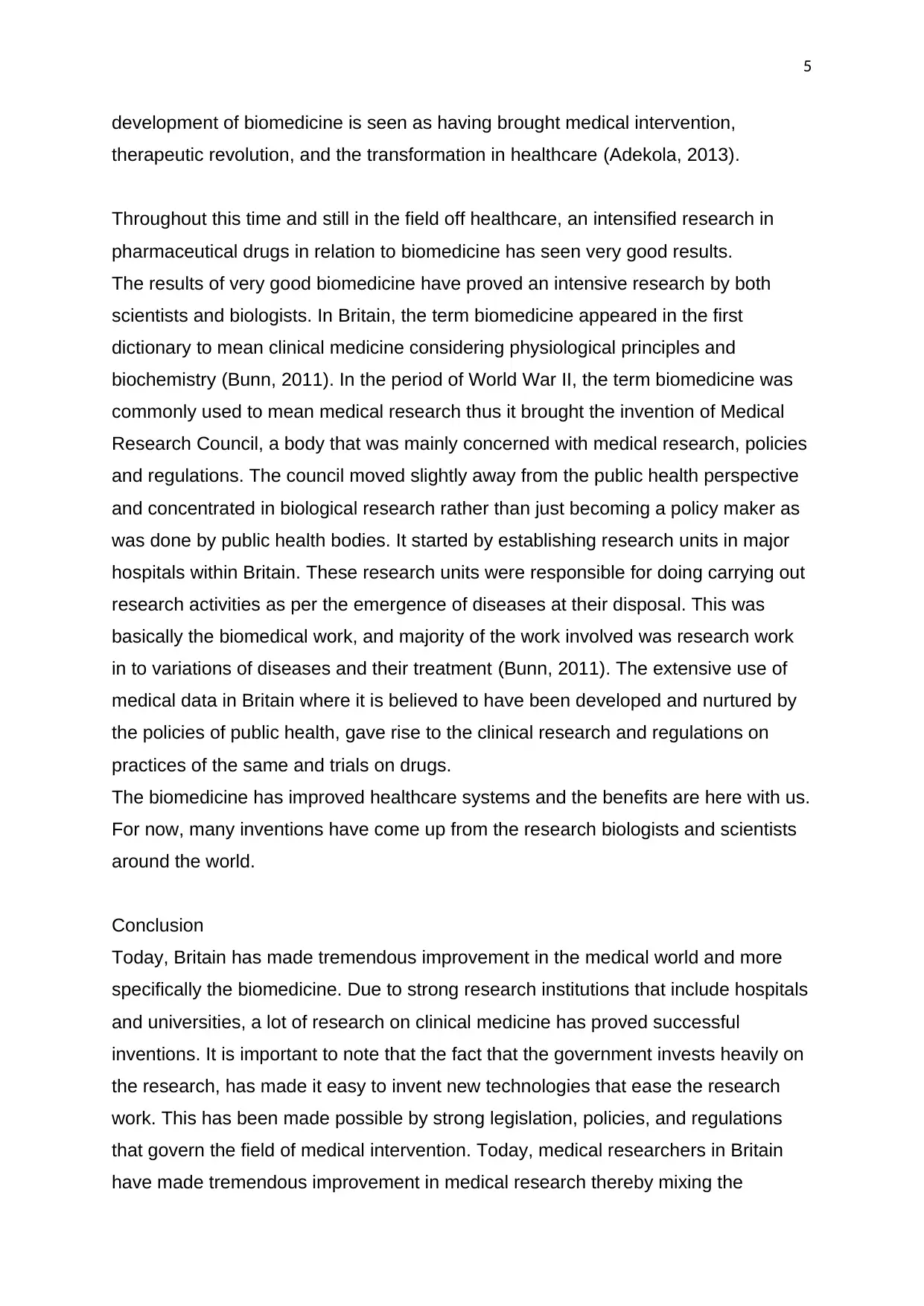
5
development of biomedicine is seen as having brought medical intervention,
therapeutic revolution, and the transformation in healthcare (Adekola, 2013).
Throughout this time and still in the field off healthcare, an intensified research in
pharmaceutical drugs in relation to biomedicine has seen very good results.
The results of very good biomedicine have proved an intensive research by both
scientists and biologists. In Britain, the term biomedicine appeared in the first
dictionary to mean clinical medicine considering physiological principles and
biochemistry (Bunn, 2011). In the period of World War II, the term biomedicine was
commonly used to mean medical research thus it brought the invention of Medical
Research Council, a body that was mainly concerned with medical research, policies
and regulations. The council moved slightly away from the public health perspective
and concentrated in biological research rather than just becoming a policy maker as
was done by public health bodies. It started by establishing research units in major
hospitals within Britain. These research units were responsible for doing carrying out
research activities as per the emergence of diseases at their disposal. This was
basically the biomedical work, and majority of the work involved was research work
in to variations of diseases and their treatment (Bunn, 2011). The extensive use of
medical data in Britain where it is believed to have been developed and nurtured by
the policies of public health, gave rise to the clinical research and regulations on
practices of the same and trials on drugs.
The biomedicine has improved healthcare systems and the benefits are here with us.
For now, many inventions have come up from the research biologists and scientists
around the world.
Conclusion
Today, Britain has made tremendous improvement in the medical world and more
specifically the biomedicine. Due to strong research institutions that include hospitals
and universities, a lot of research on clinical medicine has proved successful
inventions. It is important to note that the fact that the government invests heavily on
the research, has made it easy to invent new technologies that ease the research
work. This has been made possible by strong legislation, policies, and regulations
that govern the field of medical intervention. Today, medical researchers in Britain
have made tremendous improvement in medical research thereby mixing the
development of biomedicine is seen as having brought medical intervention,
therapeutic revolution, and the transformation in healthcare (Adekola, 2013).
Throughout this time and still in the field off healthcare, an intensified research in
pharmaceutical drugs in relation to biomedicine has seen very good results.
The results of very good biomedicine have proved an intensive research by both
scientists and biologists. In Britain, the term biomedicine appeared in the first
dictionary to mean clinical medicine considering physiological principles and
biochemistry (Bunn, 2011). In the period of World War II, the term biomedicine was
commonly used to mean medical research thus it brought the invention of Medical
Research Council, a body that was mainly concerned with medical research, policies
and regulations. The council moved slightly away from the public health perspective
and concentrated in biological research rather than just becoming a policy maker as
was done by public health bodies. It started by establishing research units in major
hospitals within Britain. These research units were responsible for doing carrying out
research activities as per the emergence of diseases at their disposal. This was
basically the biomedical work, and majority of the work involved was research work
in to variations of diseases and their treatment (Bunn, 2011). The extensive use of
medical data in Britain where it is believed to have been developed and nurtured by
the policies of public health, gave rise to the clinical research and regulations on
practices of the same and trials on drugs.
The biomedicine has improved healthcare systems and the benefits are here with us.
For now, many inventions have come up from the research biologists and scientists
around the world.
Conclusion
Today, Britain has made tremendous improvement in the medical world and more
specifically the biomedicine. Due to strong research institutions that include hospitals
and universities, a lot of research on clinical medicine has proved successful
inventions. It is important to note that the fact that the government invests heavily on
the research, has made it easy to invent new technologies that ease the research
work. This has been made possible by strong legislation, policies, and regulations
that govern the field of medical intervention. Today, medical researchers in Britain
have made tremendous improvement in medical research thereby mixing the
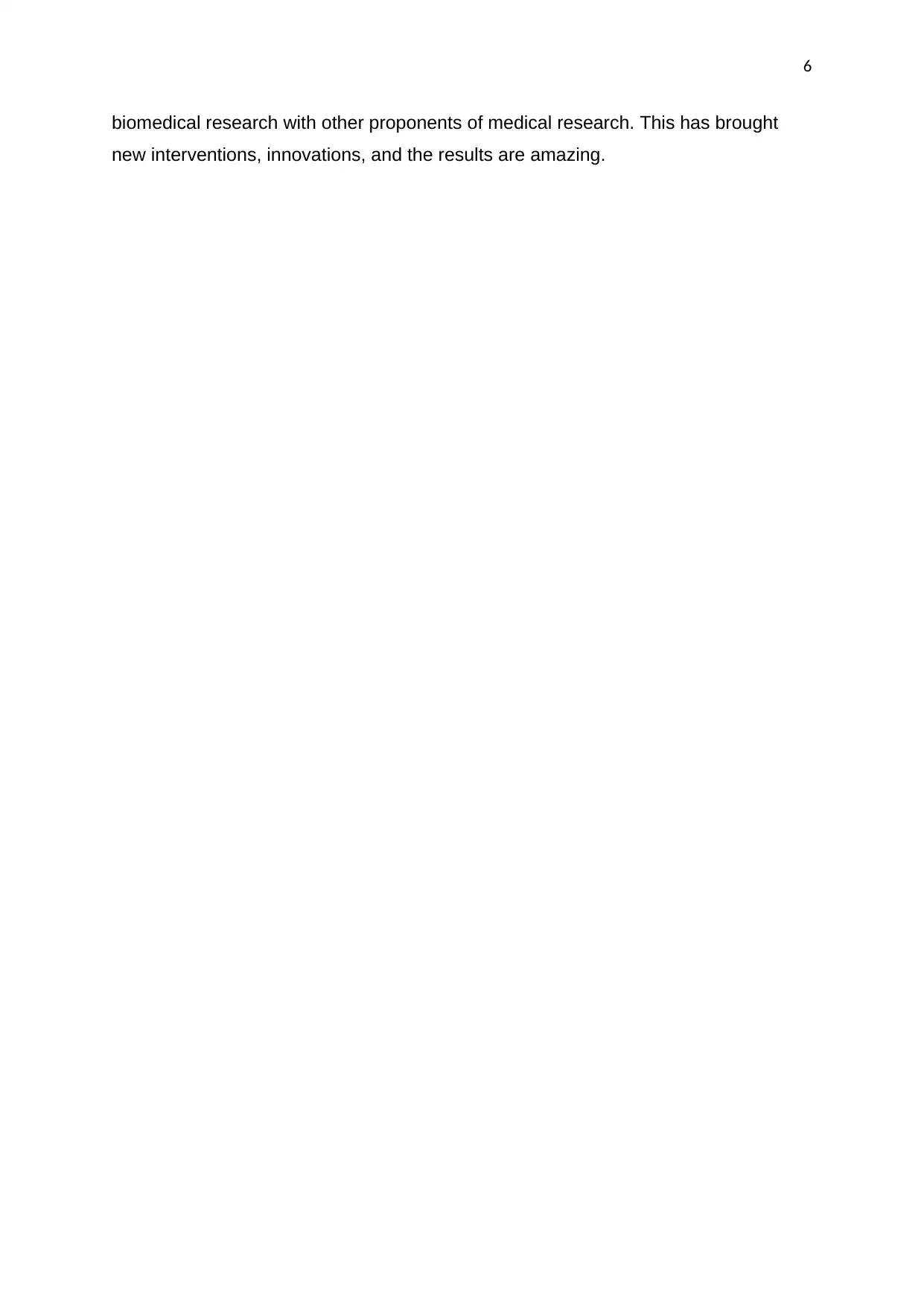
6
biomedical research with other proponents of medical research. This has brought
new interventions, innovations, and the results are amazing.
biomedical research with other proponents of medical research. This has brought
new interventions, innovations, and the results are amazing.
⊘ This is a preview!⊘
Do you want full access?
Subscribe today to unlock all pages.

Trusted by 1+ million students worldwide
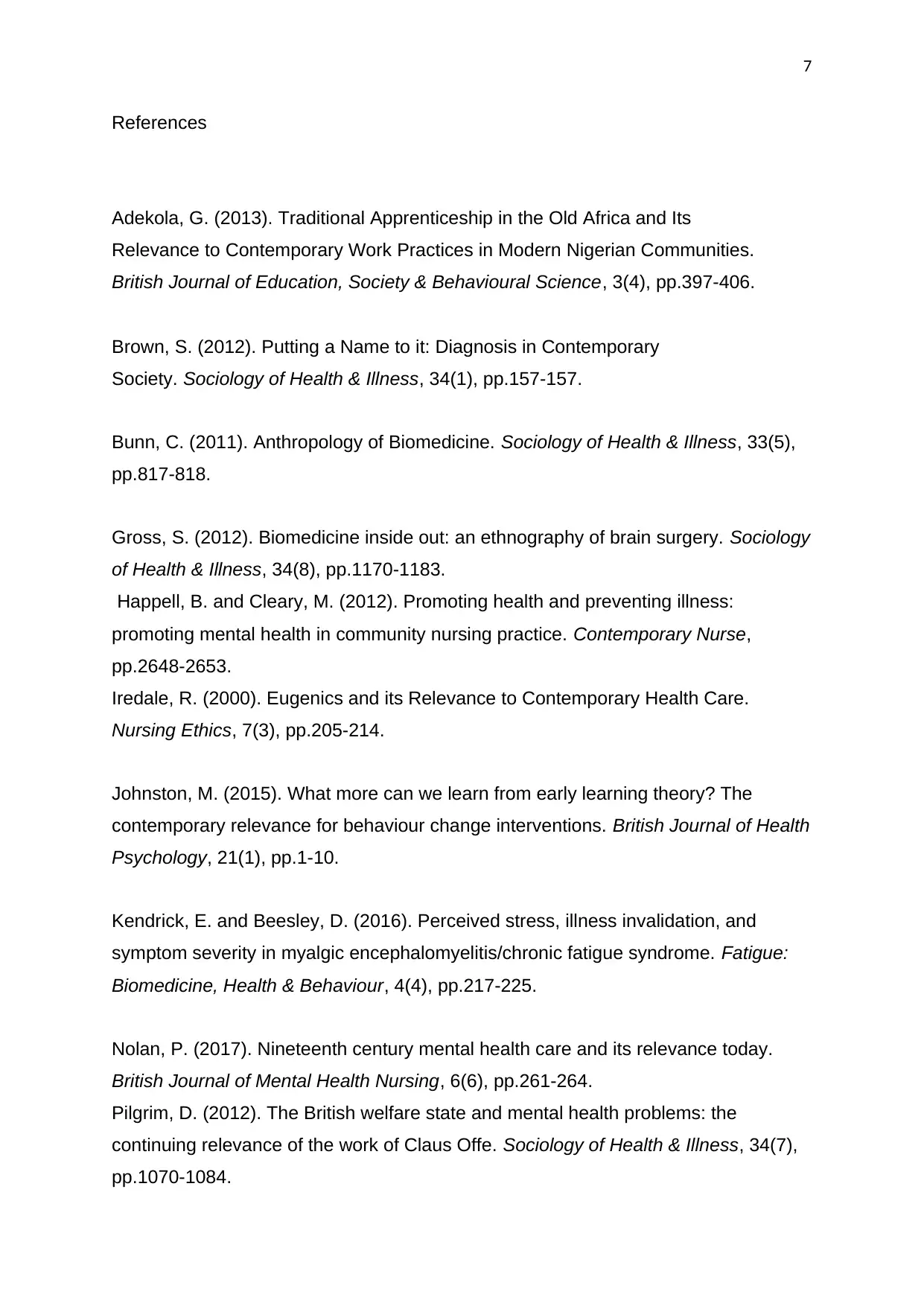
7
References
Adekola, G. (2013). Traditional Apprenticeship in the Old Africa and Its
Relevance to Contemporary Work Practices in Modern Nigerian Communities.
British Journal of Education, Society & Behavioural Science, 3(4), pp.397-406.
Brown, S. (2012). Putting a Name to it: Diagnosis in Contemporary
Society. Sociology of Health & Illness, 34(1), pp.157-157.
Bunn, C. (2011). Anthropology of Biomedicine. Sociology of Health & Illness, 33(5),
pp.817-818.
Gross, S. (2012). Biomedicine inside out: an ethnography of brain surgery. Sociology
of Health & Illness, 34(8), pp.1170-1183.
Happell, B. and Cleary, M. (2012). Promoting health and preventing illness:
promoting mental health in community nursing practice. Contemporary Nurse,
pp.2648-2653.
Iredale, R. (2000). Eugenics and its Relevance to Contemporary Health Care.
Nursing Ethics, 7(3), pp.205-214.
Johnston, M. (2015). What more can we learn from early learning theory? The
contemporary relevance for behaviour change interventions. British Journal of Health
Psychology, 21(1), pp.1-10.
Kendrick, E. and Beesley, D. (2016). Perceived stress, illness invalidation, and
symptom severity in myalgic encephalomyelitis/chronic fatigue syndrome. Fatigue:
Biomedicine, Health & Behaviour, 4(4), pp.217-225.
Nolan, P. (2017). Nineteenth century mental health care and its relevance today.
British Journal of Mental Health Nursing, 6(6), pp.261-264.
Pilgrim, D. (2012). The British welfare state and mental health problems: the
continuing relevance of the work of Claus Offe. Sociology of Health & Illness, 34(7),
pp.1070-1084.
References
Adekola, G. (2013). Traditional Apprenticeship in the Old Africa and Its
Relevance to Contemporary Work Practices in Modern Nigerian Communities.
British Journal of Education, Society & Behavioural Science, 3(4), pp.397-406.
Brown, S. (2012). Putting a Name to it: Diagnosis in Contemporary
Society. Sociology of Health & Illness, 34(1), pp.157-157.
Bunn, C. (2011). Anthropology of Biomedicine. Sociology of Health & Illness, 33(5),
pp.817-818.
Gross, S. (2012). Biomedicine inside out: an ethnography of brain surgery. Sociology
of Health & Illness, 34(8), pp.1170-1183.
Happell, B. and Cleary, M. (2012). Promoting health and preventing illness:
promoting mental health in community nursing practice. Contemporary Nurse,
pp.2648-2653.
Iredale, R. (2000). Eugenics and its Relevance to Contemporary Health Care.
Nursing Ethics, 7(3), pp.205-214.
Johnston, M. (2015). What more can we learn from early learning theory? The
contemporary relevance for behaviour change interventions. British Journal of Health
Psychology, 21(1), pp.1-10.
Kendrick, E. and Beesley, D. (2016). Perceived stress, illness invalidation, and
symptom severity in myalgic encephalomyelitis/chronic fatigue syndrome. Fatigue:
Biomedicine, Health & Behaviour, 4(4), pp.217-225.
Nolan, P. (2017). Nineteenth century mental health care and its relevance today.
British Journal of Mental Health Nursing, 6(6), pp.261-264.
Pilgrim, D. (2012). The British welfare state and mental health problems: the
continuing relevance of the work of Claus Offe. Sociology of Health & Illness, 34(7),
pp.1070-1084.
Paraphrase This Document
Need a fresh take? Get an instant paraphrase of this document with our AI Paraphraser

8
Åm, H. (2018). Ethics as ritual: smoothing over moments of dislocation in
biomedicine. Sociology of Health & Illness, New York, Longhorn.
Tsai, F. (2011). Biomedicine brings the future nearer. BioMedicine, 1(1), p.1.
Åm, H. (2018). Ethics as ritual: smoothing over moments of dislocation in
biomedicine. Sociology of Health & Illness, New York, Longhorn.
Tsai, F. (2011). Biomedicine brings the future nearer. BioMedicine, 1(1), p.1.
1 out of 8
Related Documents
Your All-in-One AI-Powered Toolkit for Academic Success.
+13062052269
info@desklib.com
Available 24*7 on WhatsApp / Email
![[object Object]](/_next/static/media/star-bottom.7253800d.svg)
Unlock your academic potential
Copyright © 2020–2026 A2Z Services. All Rights Reserved. Developed and managed by ZUCOL.





